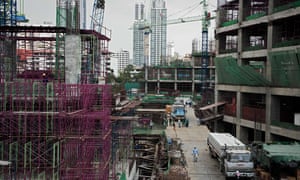A gigantic overhaul of the world’s buildings, public transport and energy infrastructure costing trillions of dollars is required if dangerous climate change is to be avoided, according to a major new report.
The study by the Global Commission on the Economy and Climate, which is co-chaired by prominent climate economist Lord Nicholas Stern, found that the world is expected to invest about $90tn in infrastructure over the next 15 years, requiring an “urgent” shift to ensure that this money is spent on low-carbon, energy-efficient projects. Such smart investment over the next two or three years could help ameliorate the climate crisis, but “the window for making the right choices is narrow and closing fast”.
The report states that more than 60% of the world’s greenhouse gases are associated with ageing power plants, roads, buildings, sanitation and other structures. Around 1,500 coal plants are estimated to already be in construction worldwide, which would send the world spiraling towards disastrous environmental changes. Carbon-heavy infrastructure “literally kills people by causing deadly respiratory illnesses, exacerbating road accidents and spreading unclean drinking water, among other hazards”, the report reads.
“It also puts pressure on land and natural resources, creating unsustainable burdens for future generations such as unproductive soils and runaway climate change.”
Stern said the next few years will be “critical” to the future of sustainable development and the battle to ensure civilization isn’t ravaged by heatwaves, extreme weather, sea level rise and other risks.
“We cannot continue with business as usual, which will lock in high-carbon infrastructure and create further congestion and pollution while choking off development opportunities, particularly for poor people,” he said. “We can and should invest in and build cities where we can move and breathe and be productive, while protecting the natural world that underpins our livelihoods.”
The financial system will need to be adjusted to make this change, the report finds. Subsidies to fossil fuels, currently totaling about $550bn a year, will need to be eliminated; better planning of projects will be required; and tools such as green bonds and green investment banking will need to be deployed.
While it will cost slightly more to make infrastructure more sustainable, the upfront costs can be fully offset by efficiency gains and fuel savings. There are also health and societal benefits – greener energy infrastructure will reduce air pollution and provide greater access to energy to people in developing countries not connected to coal-fired power grids.
Decisions made now in cities, which will house two-thirds of the global population by 2050, will influence the climate experienced later this century. To avoid gobbling up to a third of the remaining “carbon budget” that remains before the world is pushed beyond a 2C (3.6F) temperature rise compared with pre-industrial times, cities need to properly plan for integrated public transport and energy-efficient buildings.
The call comes after nations ratified the Paris climate accord, which will come into force next month. Far steeper emissions cuts than countries have pledged so far will be required if the agreement’s principal target – avoiding 2C of warming – is to be met.
“Investing in sustainable infrastructure is essential to solve all the world’s most pressing problems,” said Felipe Calderón, former president of Mexico and chair of the Global Commission. “It’s key to reigniting global growth. It’s key to reducing poverty. And it’s key to meeting the Paris agreement.”
The Paris deal includes a promise to provide funding for nations, such as low-lying islands, most vulnerable to climate change. But many major economies have been slow to ramp up spending on their own mitigation and adaptation.
A new report by the thinktank Institute for Policy Studies found the US spends 28 times more on its military than it does on climate change. It estimates that the Obama administration has requested only $21bn for 2017 to transition to clean energy, compared with the $55bn required. These figures are estimates because the federal government stopped outlining its climate change budget in 2013.
The Obama administration has made climate change a key consideration in its military endeavors but is also planning to spend $1tn to modernize its nuclear arsenal and a further $1.4tn on building F-35 fighter jets, according to the report.
“Though China has overtaken the US as the biggest producer of greenhouse gases, it is currently achieving a better balance between military and climate security spending,” said Miriam Pemberton, lead author of the report.

